The Nutragenomics Market is estimated to be valued at USD 852.2 million in 2025 and is projected to reach USD 3918.1 million by 2035, registering a compound annual growth rate (CAGR) of 16.5% over the forecast period.
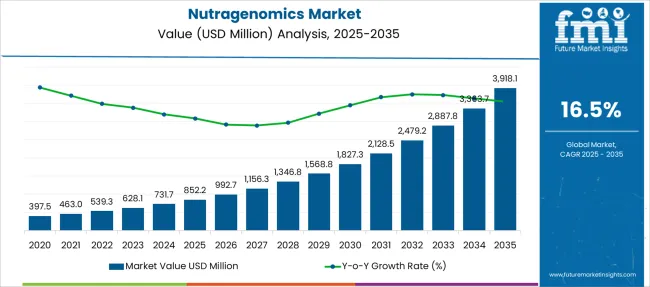
| Metric | Value |
|---|---|
| Nutragenomics Market Estimated Value in (2025 E) | USD 852.2 million |
| Nutragenomics Market Forecast Value in (2035 F) | USD 3918.1 million |
| Forecast CAGR (2025 to 2035) | 16.5% |
The nutragenomics market is advancing rapidly, driven by increasing consumer interest in personalized nutrition and health optimization. Scientific advancements have enhanced the understanding of how genetic variations influence individual responses to nutrients, paving the way for tailored dietary recommendations.
The growing focus on preventive healthcare and chronic disease management has elevated the demand for nutragenomic solutions that support targeted nutrition strategies. Healthcare providers and nutritionists are increasingly adopting these insights to develop customized dietary plans.
Additionally, technological progress in genetic testing and bioinformatics has improved the accuracy and accessibility of nutragenomic assessments. Market growth is also fueled by rising awareness among consumers regarding the impact of genetics on metabolism and disease risk. Going forward, innovations in testing methods and expanding applications across various health conditions are expected to support sustained growth. Segmental leadership is anticipated from Reagents & Kits in product offerings, Blood as the preferred technique, and Diabetics Pharmaceuticals as a key application sector.
The market is segmented by Product, Technique, and Application and region. By Product, the market is divided into Reagents & Kits and Services. In terms of Technique, the market is classified into Blood, Saliva, Buccal Swab, and Others. Based on Application, the market is segmented into Diabetics Pharmaceuticals, Cardiovascular, Anti-aging, Chronic Diseases, and Others. Regionally, the market is classified into North America, Latin America, Western Europe, Eastern Europe, Balkan & Baltic Countries, Russia & Belarus, Central Asia, East Asia, South Asia & Pacific, and the Middle East & Africa.
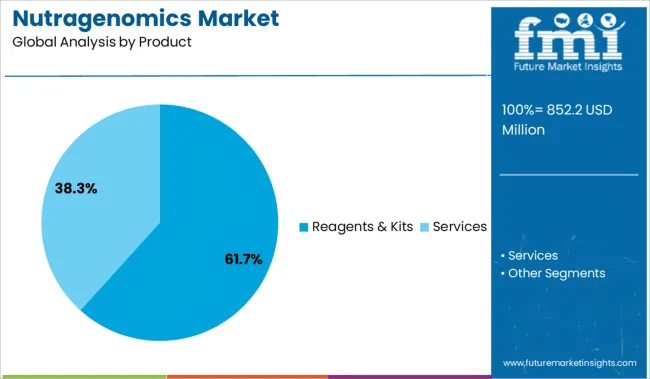
The Reagents & Kits segment is projected to hold 61.7% of the nutragenomics market revenue in 2025, maintaining its dominant position. This segment’s expansion is linked to the essential role of reagents and kits in genetic sample processing and analysis.
Laboratories and research institutions rely heavily on high-quality reagents to ensure accurate genotyping and biomarker detection. The availability of comprehensive kits that streamline testing workflows has enhanced market adoption.
Furthermore, the rise in direct-to-consumer genetic testing has driven demand for user-friendly and scalable reagent kits. As the market evolves, ongoing innovation in reagents’ sensitivity and specificity will continue to support the segment’s growth.
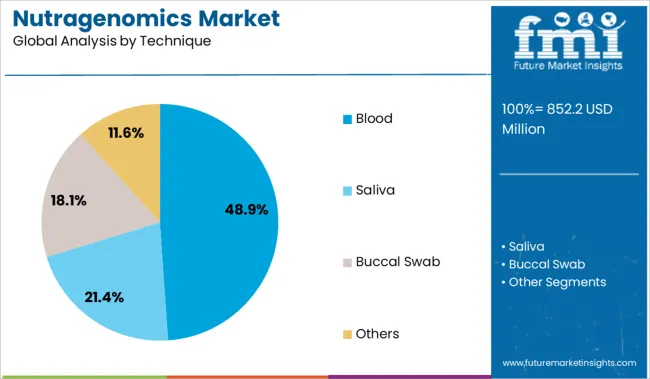
The Blood technique segment is expected to contribute 48.9% of the market revenue in 2025, leading the preferred methods for nutragenomic analysis. Blood samples offer a reliable source of genetic material and are widely used due to their consistency and ease of collection in clinical settings.
The use of blood-based testing allows for comprehensive analysis of genetic markers related to nutrient metabolism and disease predisposition. Clinical practitioners favor blood samples for their high-quality DNA yield and well-established protocols.
The technique’s compatibility with advanced sequencing and genotyping technologies further supports its dominance. As personalized nutrition gains traction, blood-based nutragenomic testing is set to remain a primary choice.
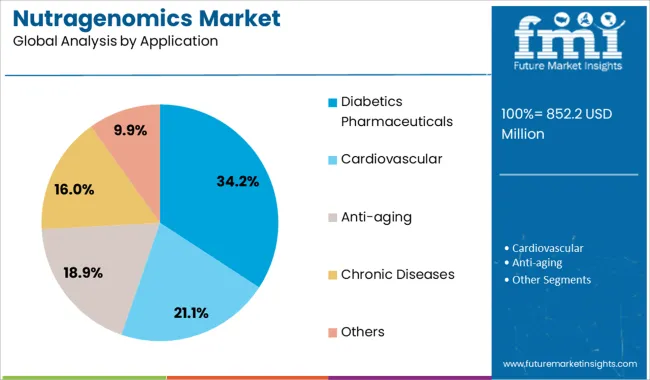
The Diabetics Pharmaceuticals segment is projected to represent 34.2% of the nutragenomics market revenue in 2025, establishing it as a significant application area. This growth is driven by the rising prevalence of diabetes and the need for personalized dietary and pharmacological interventions.
Nutragenomic insights assist in understanding individual genetic risk factors and metabolic responses, enabling optimized management of diabetes through tailored nutrition plans and medication regimens. Pharmaceutical companies and healthcare providers are incorporating nutragenomic data to improve treatment efficacy and patient outcomes.
The segment benefits from increasing patient awareness about the genetic basis of diabetes and the importance of personalized care. As diabetes management continues to evolve towards precision medicine, nutragenomics applications in this area are expected to expand significantly.
The nutragenomics market has received a lot of traction in the industry.
Gene-related and chronic diseases are becoming more common, which is why some consumers are undergoing nutragenomics tests to understand their preexisting health conditions and any potential health issues that may occur if they consume a particular food product. Manufacturers are attempting to use nutragenomics to determine whether a product will have an adverse effect on the consumer before releasing it, creating demand for nutrigenomics.
Nutragenomics kits are useful for tracking nutrient intake amongst consumers in a particular area or country. Consumers should avoid consuming phenylalanine-containing foods since they could interfere with protein synthesis and enzyme synthesis.
Companies that specialize in these fields might be able to create tests at an affordable price, or they might be able to use other techniques rather than blood and saliva for nutragenomics analysis, or they might be able to reduce the time needed for the analysis.
The manufacturers of nutragenomics kits should consider targeting regions like Europe, Japan, and the USA so that their products can be sold in greater numbers, such as kits used for their stringent and precise regulation of any food material. Integrating biological data sets along with nutragenomics approaches could lead to the development of a rapid interaction detection technique between food and genes as well as the relationship between nutrients and health, resulting in an increase in sales of nutrigenomics.
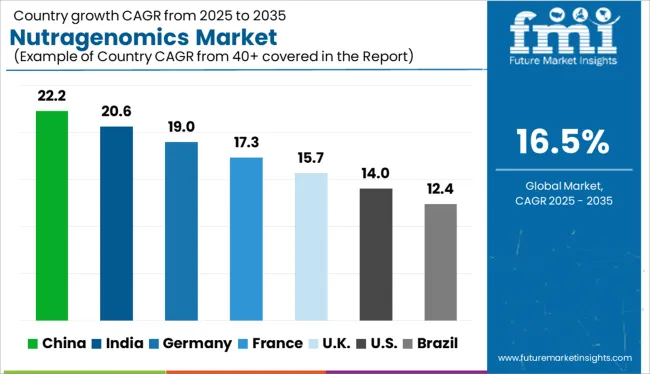
The North American nutrigenomics market is expected to outpace its global counterpart over the forecast period owing to the rapid adoption of personal genomics, the increase in the number of service providers, and the rising prevalence of lifestyle-related diseases.
It is predicted that the nutrigenomics market in Europe will expand during the forecast period as a result of increased research, strategic collaborations, and active government support.
The Asia Pacific is expected to drive notable growth in the nutragenomics market due to the large number of patients suffering from lifestyle diseases, in addition to lucrative pricing strategies being applied by various start-up companies in these regions.
According to a survey by a research institution in nine countries with 9000 participants, nutrigenomics has been widely accepted, and people are ready to adopt it if offered a legal guarantee that genetic data will not be misused. The Asia Pacific region is also expected to experience strong growth in the nutragenomics market due to the growing demand for functional foods and beverages that have elevated the adoption of nutrigenomic techniques.
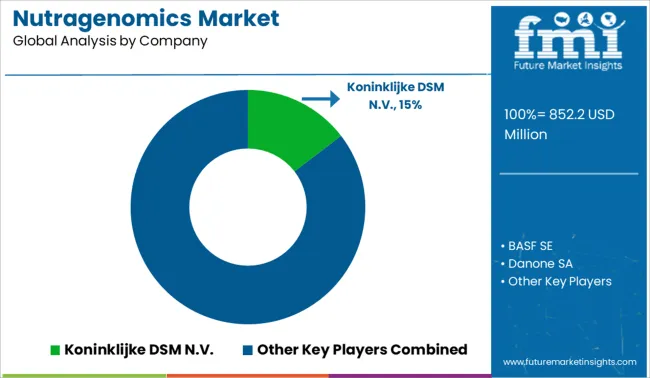
Some of the leading companies operating in the global nutragenomics market include Koninklijke DSM N.V., BASF SE, Danone SA, Genova Diagnostics, Inc., Nutrigenomix Inc., The Unilever Group, XCode Life Sciences Private Limited, WellGen, Inc., Integrative Medicine Communications. Inc., and Receptor Logic, Inc.
There are many companies that are focusing on acquiring and collaborating with various facilities for the development of ideal genetic tests. The development of better testing kits and their approval by regulatory bodies is the main hurdle facing all of these companies, and these changes will help propel the nutragenomics market growth in the future.
A collaboration between 23&Me and GlaxoSmithKline took place in June 2020. This collaboration will focus on investigating and developing innovative medicines and potential cures using human genetics as a starting point.
With the launch of The Global Genetic Project in February 2020, 23&Me seeks to improve its understanding of human genetic diversity and provide insights into health conditions that may affect populations underrepresented in genetic research, thereby affecting the growth rate in the global nutragenomics market.
| Report Attribute | Details |
|---|---|
| Growth Rate | CAGR of 16.48% from 2025 to 2035 |
| Base Year for Estimation | 2024 |
| Historical Data | 2020 to 2024 |
| Forecast Period | 2025 to 2035 |
| Quantitative Units | Revenue in USD Billion, Volume in Kilotons, and CAGR from 2025 to 2035 |
| Report Coverage | Revenue Forecast, Volume Forecast, Company Ranking, Competitive Landscape, Growth Factors, Trends, and Pricing Analysis |
| Segments Covered | Product Type, Technique, Application |
| Regions Covered | North America; Latin America; Europe; East Asia; South Asia; Oceania; Middle East and Africa |
| Key Countries Profiled | USA, Canada, Brazil, Mexico, Germany, United Kingdom, France, Spain, Italy, Russia, Poland, Australia, New Zealand, China, India, Japan, South Korea, Thailand, Malaysia, Vietnam, Indonesia, GCC Countries, Turkey, South Africa, North Africa |
| Key Companies Profiled | Koninklijke DSM N.V.; BASF SE, Danone SA; Genova Diagnostics, Inc; Nutrigenomix Inc.; The Unilever Group; XCode Life Sciences Private Limited; WellGen, Inc.; Integrative Medicine Communications. Inc.; Receptor Logic, Inc |
| Customization | Available Upon Request |
The global nutragenomics market is estimated to be valued at USD 852.2 million in 2025.
The market size for the nutragenomics market is projected to reach USD 3,918.1 million by 2035.
The nutragenomics market is expected to grow at a 16.5% CAGR between 2025 and 2035.
The key product types in nutragenomics market are reagents & kits and services.
In terms of technique, blood segment to command 48.9% share in the nutragenomics market in 2025.






Full Research Suite comprises of:
Market outlook & trends analysis
Interviews & case studies
Strategic recommendations
Vendor profiles & capabilities analysis
5-year forecasts
8 regions and 60+ country-level data splits
Market segment data splits
12 months of continuous data updates
DELIVERED AS:
PDF EXCEL ONLINE

Thank you!
You will receive an email from our Business Development Manager. Please be sure to check your SPAM/JUNK folder too.
Chat With
MaRIA